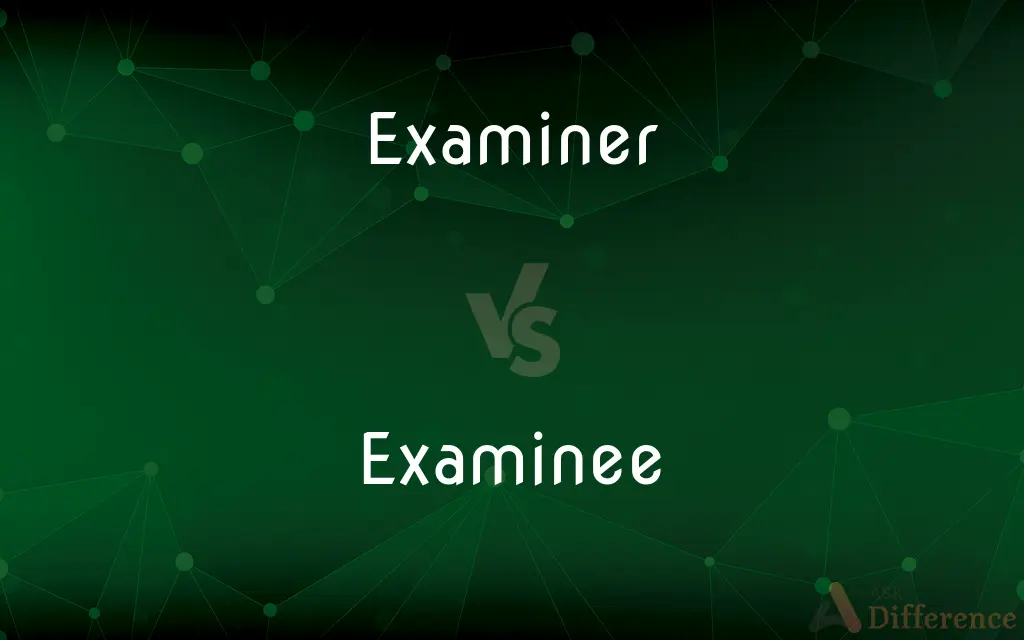Examiner vs. Examinee — What's the Difference?
By Maham Liaqat & Fiza Rafique — Updated on March 18, 2024
An examiner is a person who assesses or evaluates, often in academic or professional contexts, while an examinee is the individual being tested or evaluated.

Difference Between Examiner and Examinee
Table of Contents
ADVERTISEMENT
Key Differences
An examiner is typically someone with the authority and expertise to conduct assessments, tests, or evaluations in various fields, including education, certification processes, and legal proceedings. They are responsible for setting examination criteria, administering tests, and evaluating the performance of examinees. On the other hand, an examinee is the person who undergoes the examination or assessment process. Examinees are often students, candidates for professional certification, or individuals seeking qualifications or licenses.
The relationship between an examiner and an examinee is defined by the examination process, where the examiner facilitates and evaluates, and the examinee responds and participates. This dynamic is crucial in educational assessments, professional certifications, and other evaluative processes where objective measurement of skills, knowledge, or competencies is required.
In many contexts, the role of an examiner involves not only assessing the examinee's performance but also providing feedback or grades that contribute to the examinee's academic or professional advancement. The integrity and fairness of the examiner are paramount, as they significantly impact the outcomes for the examinee and the credibility of the examination process.
The distinction between examiner and examinee highlights the roles individuals play within the context of assessments and evaluations. While examiners hold the responsibility for conducting assessments fairly and accurately, examinees are tasked with demonstrating their competence, knowledge, or skills within the framework established by the examination.
Comparison Chart
Definition
A person who assesses or evaluates in various contexts.
The individual being tested or evaluated.
ADVERTISEMENT
Role
Sets criteria, administers tests, and evaluates performance.
Responds to assessments and demonstrates knowledge or skills.
Responsibility
Ensure fairness, impartiality, and adherence to standards.
Prepare for and participate in the examination process.
Context
Education, certification, legal proceedings.
Academic exams, professional certifications, licensing tests.
Outcome
Provides feedback, grades, or qualifications.
Receives evaluation of performance or competencies.
Compare with Definitions
Examiner
Authority in assessments.
The examiner set difficult but fair questions for the final exam.
Examinee
Subject to evaluation.
The examinee nervously awaited the start of the oral examination.
Examiner
Upholds standards.
The examiner ensured that all tests were conducted in accordance with the guidelines.
Examinee
Participates in exams.
Examinees were required to arrive 30 minutes early for the examination.
Examiner
Impacts outcomes.
The examiner's impartiality is crucial for the integrity of the certification process.
Examinee
Demonstrates knowledge.
The examinee prepared extensively, covering all topics outlined in the syllabus.
Examiner
Evaluates performance.
As an examiner, her role was to grade the essays based on a set rubric.
Examinee
Receives feedback.
Each examinee received personalized feedback along with their grade.
Examiner
Provides feedback.
The examiners discussed the results and provided constructive feedback to each student.
Examinee
Aims for qualifications.
The examinee's performance in the practical test was crucial for obtaining the license.
Examiner
To observe carefully or critically; inspect
Examined the room for clues.
Examinee
One that is examined.
Examiner
To study or analyze
Examine a tissue sample under a microscope.
Examine the structure of a novel.
Examine one's own motives.
Examinee
One who sits an examination.
Examiner
To test or check the condition or health of
Examine a patient.
Examinee
A person examined.
Examiner
To determine the qualifications, aptitude, or skills of by means of questions or exercises
Students are examined with standardized tests.
Examinee
Someone who is tested (as by an intelligence test or an academic examination)
Examiner
To question formally, as to elicit facts or information; interrogate
Examine a witness under oath.
Examinee
One who is examined, e.g. for medical reasons.
Examiner
A person who investigates someone or something.
Examiner
A person who sets an examination.
Examiner
A person who marks an examination.
Examiner
One who examines, tries, or inspects; one who interrogates; an officer or person charged with the duty of making an examination; as, an examiner of students for a degree; an examiner in chancery, in the patent office, etc.
Examiner
Someone who administers a test to determine your qualifications
Examiner
An investigator who observes carefully;
The examiner searched for clues
Common Curiosities
Can an examinee challenge the examiner's evaluation?
Yes, in many systems, examinees have the right to challenge or appeal against the evaluation if they believe there has been an error or unfair treatment.
What qualifications should an examiner possess?
An examiner should possess thorough knowledge of the subject, expertise in assessment methodologies, and the ability to maintain impartiality and fairness.
What responsibilities do examinees have during an examination?
Examinees are responsible for understanding the examination requirements, preparing adequately, adhering to the rules, and giving their best effort.
How can an examiner ensure fairness in the examination process?
An examiner can ensure fairness by adhering strictly to evaluation criteria, avoiding bias, and ensuring all examinees have the same conditions and opportunities.
Are examiners always external to the institution conducting the exam?
Not necessarily; examiners can be internal (from the same institution) or external, depending on the examination's nature and the governing policies.
What ethical considerations must an examiner keep in mind?
Ethical considerations include maintaining confidentiality, avoiding conflicts of interest, ensuring equality, and upholding the integrity of the examination process.
Can the role of an examinee and examiner interchange?
Yes, individuals can find themselves in both roles at different times, such as a teacher who examines students but is also an examinee in professional development assessments.
How is an examiner chosen?
Examiners are typically chosen based on their expertise, experience, and sometimes through a formal selection process, ensuring they meet the required standards.
What impact does the examiner's feedback have on an examinee?
The examiner's feedback can significantly impact an examinee by providing insights into areas of strength and weakness, influencing learning and improvement.
How do cultural differences affect the roles of examiner and examinee?
Cultural differences can influence communication styles, expectations, and perceptions of the examination process, requiring sensitivity and adaptability from both examiners and examinees.
Share Your Discovery

Previous Comparison
Shared vs. Sharer
Next Comparison
Noodle vs. MoodleAuthor Spotlight
Written by
Maham LiaqatCo-written by
Fiza RafiqueFiza Rafique is a skilled content writer at AskDifference.com, where she meticulously refines and enhances written pieces. Drawing from her vast editorial expertise, Fiza ensures clarity, accuracy, and precision in every article. Passionate about language, she continually seeks to elevate the quality of content for readers worldwide.















































